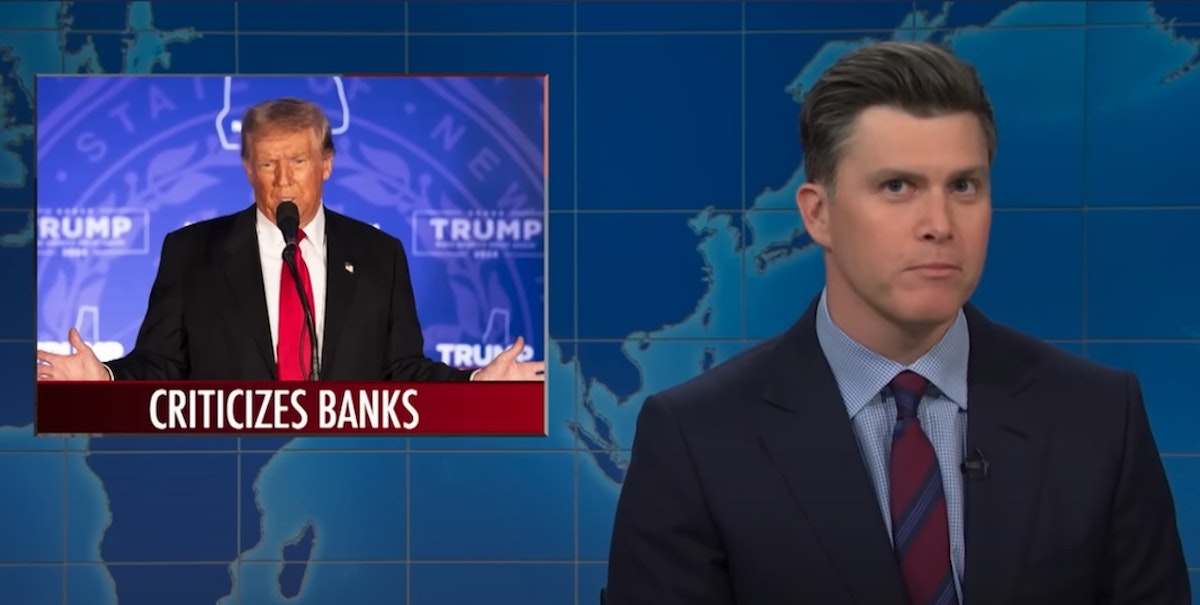Saturday Night Live made headlines this weekend for all the wrong reasons. During Weekend Update, a cast member suggested that Donald Trump stumbled and introduced a “new term” to the debate called “de-banking.” What followed was a rather feeble attempt at mocking the former president.
In reality, de-banking is no laughing matter. It means losing essential financial services, like a bank account, payment processing, or even insurance, because of your views. And it is on the rise — so much so that the U.S. Supreme Court is set to hear arguments involving the issue this term.
Funny enough, the case originates in the Empire State (“Live from New York,” anybody?), where the National Rifle Association is challenging New York’s attempt to coerce banks and insurance companies to withdraw services from the group. The NRA alleges that the Department of Financial Services — at the behest of then-Governor Andrew Cuomo — used its vast power to regulate “reputational risk” along with back-channel meetings, public investigations, and threats of fines to punish the group for its Second Amendment advocacy.
This is not an isolated incident. A string of religious ministries and conservative groups have also been victimized by de-banking. As Alliance Defending Freedom points out in a friend-of-the-court brief filed in support of the NRA’s position, pro-life group Heartbeat International was recently canceled by its insurance provider over its “anti-abortion” advocacy.
Likewise, Bank of America de-banked Indigenous Advance Ministries, an ADF client that serves impoverished Ugandan widows and orphans. The bank closed Indigenous Advance’s long-standing account as well as the account of a local church that donates to the ministry. The bank claimed it no longer wanted to serve their “business type” and that Indigenous Advance exceeded the “bank’s risk tolerance.”
It did this right before a planned mission trip to Uganda, sending Indigenous Advance scrambling to open new accounts and drastically reducing the funds for the trip. It couldn’t pay its Ugandan ministry partners — who live meal to meal — for several weeks. And it had to temporarily reduce aid to the impoverished people they serve.
Similar instances of de-banking abound. Former Brexit leader Nigel Farage’s high-profile case resulted in the ouster of megabank NatWest’s CEO. Serial offender JPMorgan Chase’s hit list includes the Arkansas Family Council, Defense of Liberty, and U.S Ambassador Sam Brownback’s National Committee for Religious Freedom.
There are many reasons for this phenomenon, but the root cause is vague terms of service.
“Reputational” and “social” risk policies pervade financial institutions. Customers at all 28 commercial banks scored in Alliance Defending Freedom’s index that measures corporate respect for free speech and religious freedom are currently vulnerable to de-banking.
Most alarmingly, 7 of the nation’s 10 largest commercial banks — including the top 3 — have “reputational risk” or “hate speech” policies. These policies’ overly broad and subjective language permit employees to discriminate based on a customer’s viewpoint and then hide their viewpoint-based actions behind opaque standards. They also allow abuse by government regulators.
A positive ruling in the NRA case — which, in a comedic twist that should provide fodder for SNL writers, is being argued by the ACLU — would affirm that the government cannot carry out its censorship schemes by co-opting third parties as censors. That would help. But that does not address the many de-banking decisions that can be laid at the feet of private actors.
The solution to this problem may lie with the states. This state legislative season presents an opportunity for states interested in protecting against politicized de-banking to act. Any such law should focus on the worst actors – the largest banks and payment processors. Thanks to wide-reaching government benefits, such as greater lending power, FDIC insurance rates, subsidies, bailouts, and an anticompetitive chartering system, these institutions dominate their markets over state-level competitors yet are responsible for the worst de-banking incidents.
At a minimum, the law should prohibit denial of services based on religious or political beliefs, give customers the right to ask for a detailed explanation when services are denied, empower the attorney general to enforce the statute, and provide aggrieved customers a private right of action.
No one should have to worry that they could lose their bank account, insurance coverage, or other essential financial services because of their religious or political views. Yet it’s clear that vague financial service policies abused by private and government actors pose a serious threat to everyone’s freedom of speech and religion.
So, an inadvertent thanks to our pals at SNL for bringing up de-banking. It’s about time we talked about it. And it’s about time for the law to require viewpoint neutrality from the biggest banks and payment processors.
* * *
Jeremy Tedesco is senior counsel and senior vice president of Corporate Engagement for Alliance Defending Freedom (@ADFLegal).
The views expressed in this piece are those of the author and do not necessarily represent those of the Daily Wire.

